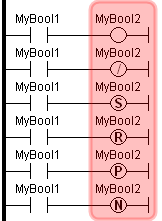FFLD Coils
Coils are basic graphic elements of the FFLD language.
- A coil is associated with a Boolean variable displayed above the graphic symbol.
- A coil performs a change of the associated variable according to the flow on its left-hand side.
- The six possible coil symbols are:
|
Variable |
Coils |
Description |
|---|---|---|
|
Negated |
boolVariable |
The associated variable is forced to the negation of the flow on the left of the coil. |
|
Negative Transition |
boolVariable |
The associated variable is forced to TRUE if the flow on the left changes from TRUE to FALSE (and forced to FALSE in all other cases). |
|
Normal |
boolVariable |
The associated variable is forced to the value of the flow on the left of the coil. |
|
Positive Transition |
boolVariable |
The associated variable is forced to TRUE if the flow on the left changes from FALSE to TRUE (and forced to FALSE in all other cases). |
|
Reset |
boolVariable |
The associated variable is forced to FALSE if the flow on the left is TRUE. No action if the rung state is FALSE.
|
|
Set |
boolVariable |
The associated variable is forced to TRUE if the flow on the left is TRUE. No action if the flow is FALSE.
|
-
-
When a contact or coil is selected, you can press the Spacebar to change its type (normal, negated...).
When your application is running, you can select a contact and press the Spacebar to swap its value between TRUE and FALSE.
-
-
Although coils are commonly put at the end, the rung can be continued after a coil.
The flow is never changed by a coil symbol.







